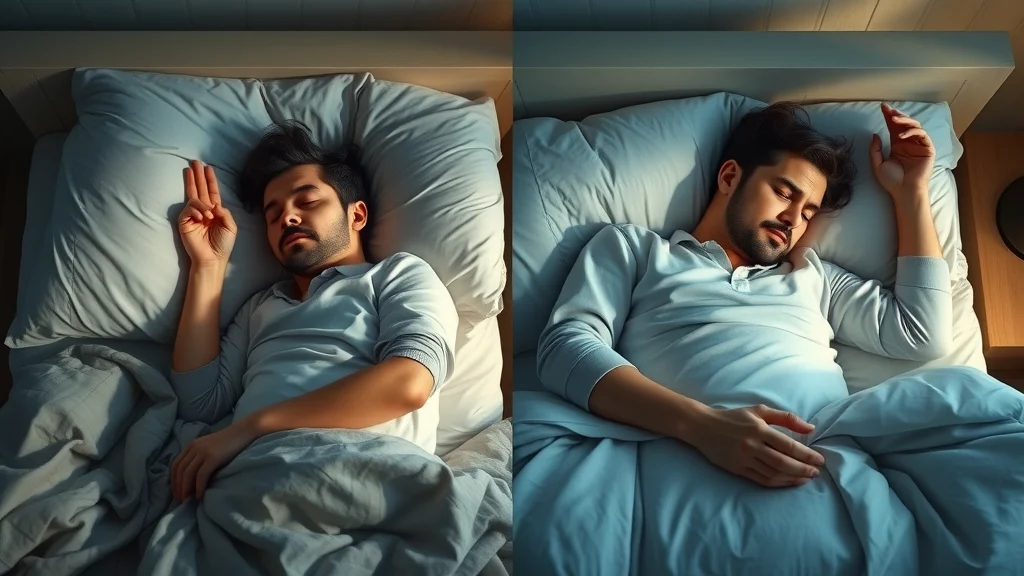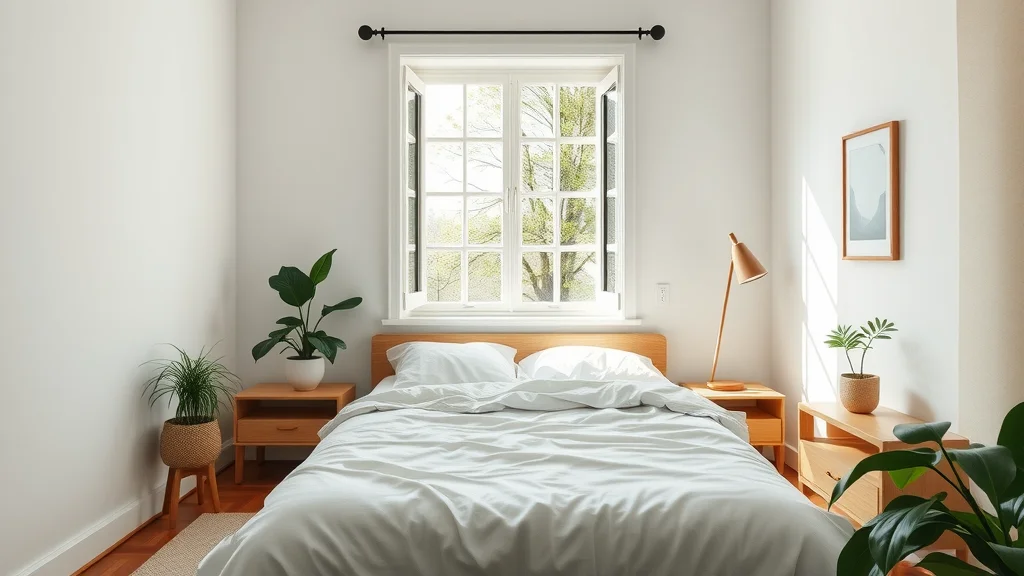Ever wonder why you still feel drained despite a full night's sleep? Understanding the hidden causes of exhaustion is key to reclaiming your energy. Discover why rest alone isn’t enough and learn what truly restores your vitality for good.

Why Am I Exhausted Even Though I Get Enough Sleep? The Hidden Truths Revealed
"Fatigue is not necessarily one of the main signs of sleep deprivation. Getting used to it doesn't mean that's all [the sleep] you need. It means you forget what it feels like to have good sleep. Sleep deprivation increases risk of depression, anxiety, and being particularly reactive to stress.” - Dr. Holly Phillips, MD
Every morning you wake up after what feels like a full eight hours of sleep, yet you’re still haunted by heavy eyelids and daytime fatigue. You may ask yourself: “Why am I exhausted even though I get enough sleep?” For many, exhaustion persists despite clocking enough hours of sleep. In fact, millions of people fall into this puzzling cycle—chasing more sleep without ever feeling truly restored.
What if the cause isn’t just about how long you’re in bed, but something more complex? Maybe it’s related to your sleep quality, overlooked sleep disorders like sleep apnea, underlying health conditions, or even undiagnosed mental health factors. The path to vibrant energy is about more than just hitting your pillow. Let’s dig into the silent culprits draining your vitality—and the science-backed steps to finally reclaim your energy.
What You'll Learn From This Guide
The real causes behind persistent exhaustion
How sleep quality differs from sleep quantity
Which health conditions contribute to tiredness
Practical steps to reclaim your everyday energy
When to consult with sleep medicine specialists

Understanding Sleep: Quantity Versus Quality Sleep
People often focus on “getting eight hours” without considering what truly makes sleep restorative. Quality sleep and sleep quantity are not the same. It’s possible to stay in bed for seven or even nine hours and still wake up groggy, feeling fatigued, or suffering from daytime sleepiness. Your sleep cycle includes both deep and light sleep; without completing all sleep stages (especially restorative deep sleep), you risk waking up as tired as you were before bed.
Studies show that even healthy adults can have poor sleep due to issues like restless tossing, waking often, or environmental disturbances. These factors sabotage the brain’s ability to perform key repair tasks during the night, and consistent interference lowers energy levels during the day. Addressing sleep quality makes a measurable difference in how rested you feel—even if your total sleep time remains unchanged.
How Quality Sleep Impacts Why Am I Exhausted Even Though I Get Enough Sleep
Why you can sleep 8 hours and still feel exhausted
Exploring what makes sleep 'restorative'
Common barriers to achieving quality sleep
Have you ever asked yourself, "I get a full eight hours of sleep, so why am I exhausted the next day?" The answer usually lies in the difference between sleep time and actual restfulness.
Restorative sleep involves unbroken time in the deeper stages of your sleep cycle, when your body recovers, memory consolidates, and hormones balance. If you toss, wake repeatedly, or have untreated sleep disorders, you may never reach those deeper stages consistently. That’s why, regardless of the number of hours logged, you still feel tired.
Barriers to quality sleep include late-night screen time disrupting melatonin, caffeine intake, frequent urination, unmanaged stress, or underlying medical issues. Poor sleep quality opens the door to accidental napping, daytime irritability, and excessive daytime sleepiness.
Prioritizing a relaxing nighttime routine, keeping sleep hygiene practices, and optimizing your bedroom can greatly improve your sleep quality and ultimately your day-to-day energy levels.

If you find that exhaustion lingers even after improving your sleep habits, it may be time to look inward and address the mental side of fatigue. Exploring how your inner dialogue and mindset affect your overall well-being can be a powerful next step—discover practical ways to activate your brain's inner coach for better mental health and support your journey toward lasting energy.
Comparison: Quality Sleep vs. Quantity Sleep — Effects on Energy Levels
Aspect |
Quality Sleep |
Quantity Sleep |
|---|---|---|
Definition |
Uninterrupted, restorative sleep with full sleep cycles completed |
Total hours asleep, regardless of consistency or depth |
Energy Levels |
Wake up refreshed and alert |
May still feel tired or groggy |
Main Barriers |
Sleep disorders, stress, environment, chronic health or mental health issues |
Poor sleep schedule, staying in bed longer without addressing interruptions |
Sustainable Results |
Supports lasting health and daytime energy |
Temporary relief, often leads to persistent exhaustion |

Why Do I Feel Exhausted Even Though I Sleep Enough?
It’s normal to feel disappointed when “enough sleep” doesn’t translate into energy. If you feel tired during the day or constantly deal with daytime fatigue, sleep deprivation may not be the culprit, but rather hidden factors like fragmented sleep, stress, or undiagnosed medical conditions.
Many adults unknowingly live with issues like sleep apnea or restless leg syndrome, leading to frequent awakenings throughout the night, cutting short their deep sleep stages.
Answering the Common Question: Why Am I Exhausted Even Though I Get Enough Sleep?
This question is incredibly common, especially among adults balancing heavy workloads, family life, or underlying health conditions. Think beyond your hours of sleep—true rest is about what happens while you’re asleep. Sleep cycles play a crucial role; without uninterrupted deep sleep, your cells, brain, and immune system miss vital repair time.
If you still feel tired after what should be restorative sleep, it may be time to evaluate your overall mental and physical health, lifestyle choices, and consult a healthcare provider or sleep medicine expert to rule out or treat undiagnosed sleep disorders.
Common Sleep Disorders: The Silent Energy Thieves
Some of the biggest energy thieves lurk silently in the night. Sleep disorders often slip by undetected, yet their side effects—chronic exhaustion, brain fog, and mood swings—can severely erode your quality of life.
The good news? Identifying and treating these issues promptly can dramatically increase your energy levels and help you stop wondering, "Why am I exhausted even though I get enough sleep?"
Sleep Apnea and Its Connection to Feeling Exhausted
"Sleep apnea is a leading cause of unrefreshing sleep. Patients are often unaware but wake exhausted every morning." – Dr. Lisa Chen, sleep medicine specialist
Sleep apnea, especially obstructive sleep apnea, interrupts your breathing multiple times an hour overnight, each disruption pulling your brain out of deep sleep to re-establish airflow. What’s worse, many patients are unaware it’s happening, attributing their excessive daytime sleepiness and brain fog to stress or aging.
Left untreated, sleep apnea raises your risk for serious health problems—including high blood pressure, heart disease, and diabetes—and nearly guarantees waking up tired, no matter how long you stay in bed.
Other Sleep Disorders That Impact Why Am I Exhausted Even Though I Get Enough Sleep
Restless leg syndrome
Insomnia and trouble falling asleep
Circadian rhythm disorders
Other common sleep disorders can also explain persistent fatigue. Restless leg syndrome triggers involuntary leg movements that disrupt continuous sleep, while insomnia makes it hard to both fall asleep and stay asleep.
Circadian rhythm disorders—often seen in shift workers or those frequently crossing time zones—cause your internal clock to become misaligned, so you’re sleepy at the wrong hours.
Together, these conditions repeatedly pull you out of deep, restorative stages of the sleep cycle, leaving you feeling fatigued no matter your total hours of sleep.

How Mental Health and Medical Conditions Cause Persistent Exhaustion
Chronic exhaustion isn’t always about physical rest—sometimes, your mental health or underlying health conditions are to blame. Depression, anxiety, chronic stress, and various medical conditions can all sabotage your energy reserves, even if your sleep appears adequate on paper. In these cases, improving your quality of life requires a comprehensive, compassionate approach.
Mental Health Factors That Affect Why Am I Exhausted Even Though I Get Enough Sleep
Depression and chronic anxiety
Stress-related exhaustion
Mental health and emotional well-being are deeply linked to how rested (or exhausted) you feel. Even with enough sleep, depression and chronic anxiety can disrupt your sleep cycle by making it hard to fall asleep, stay asleep, or experience deep sleep. These conditions are frequently linked with daytime fatigue, lack of motivation, and concentration difficulties.
Stress, too, increases cortisol production, which can both shrink sleep time and reduce sleep quality—leaving you waking up just as tired as when you went to bed. Addressing mental health with therapy, mindfulness, and sometimes medications can powerfully shift your baseline energy.
Chronic Health Conditions and Medical Issues
Thyroid disorders
Diabetes
Chronic fatigue syndrome
Undiagnosed health conditions
If you’re still wondering, “Why am I exhausted even though I get enough sleep?” consider visiting your healthcare provider to rule out health conditions that destroy energy from the inside out. Common culprits include underactive thyroid (hypothyroidism), diabetes, anemia, heart disease, and chronic fatigue syndrome (also known as myalgic encephalomyelitis).
Chronic fatigue syndrome, in particular, causes ongoing exhaustion no matter your sleep hygiene. Undiagnosed infections or nutritional deficiencies can also masquerade as simple tiredness, so it’s crucial to seek personalized medical guidance if persistent fatigue affects your daily life.
Lifestyle Habits That Sabotage Your Energy Despite Enough Sleep
Sometimes, it’s your daily habits—not just health conditions or sleep disorders—that keep your energy depleted. Lifestyle choices play a pivotal role in how restored you feel every morning. Let’s examine how inconvenient patterns, from screen use to poor nutrition, can silently erode your daytime energy.
Daily Choices That Leave You Wondering: 'Why Am I Exhausted Even Though I Get Enough Sleep?'
Screen time before bed and how it affects falling asleep
Irregular sleep schedule and shift work
Poor nutrition and its silent impact on energy
Dehydration
Your everyday routines directly shape your ability to achieve quality sleep and, in turn, how energized you feel. Screen time before bed exposes your brain to blue light, which suppresses melatonin and delays the time it takes to fall asleep. Irregular sleep schedules—including shift work or late nights—disrupt your body’s natural clock, making it harder to maintain a stable sleep cycle.
Nutrition also matters: relying on processed foods or skipping meals can trigger blood sugar swings leaving you feeling fatigued even after a good night’s sleep. Don’t overlook the basics—hydration is essential for cell function, and even mild dehydration can lower your energy levels by 10% or more.
Making intentional adjustments to your sleep environment, planning movement into your day, and nourishing your body well all impact your sleep quality. If you’re committed to unlocking natural energy, refining your lifestyle habits is a foundational step.

What I Learned from a Sleep Expert About the Power of Small Habits
When I sat down with sleep expert Heidi N., one story stood out — a woman she called Sarah (not her real name, for privacy reasons). Sarah arrived feeling utterly drained. She was anxious, running on fumes, and convinced she was drowning in her own to-do list. Like many of us, she’d been told it was “just stress” and that she should “try to relax.” (Easier said than done when you’re running on caffeine and hope.)
Heidi told me that her approach with Sarah started with the basics — not expensive sleep gadgets or strict diets, but simple, science-backed changes. The first step was hydration. Sarah began drinking more water and adding electrolytes throughout the day. Within a week, her energy picked up — a small win that set the stage for bigger changes.
Next came her sleep routine. Heidi guided Sarah to power down her phone an hour before bed and turn her bedroom into a calm, dark, and quiet space — what Heidi calls a “sleep-friendly oasis.” Slowly, Sarah began falling asleep more easily and waking up actually refreshed instead of restless.
Then, they tackled stress — the silent sleep killer. Sarah started practicing short, mindful breathing breaks during the day and learned to say “no” to commitments that didn’t serve her. That single habit made a surprising difference in her ability to unwind.
Finally, after a round of bloodwork, they discovered Sarah was low in magnesium, a common but overlooked deficiency linked to anxiety and poor sleep. With the right supplementation and a diet rich in whole foods, Sarah noticed her anxiety decrease, her energy stabilize, and her overall mood improve dramatically.
As Heidi explained, Sarah’s story isn’t a formal clinical case study — but it reflects what she sees repeatedly in her work: when people address the fundamentals — hydration, rest, nutrition, and stress management — their mental clarity, mood, and energy all begin to transform.
So if you’re looking to reduce anxiety naturally and finally sleep better at night, start small. As Heidi put it, “You don’t need to overhaul your life — you just need to support it.”

How to Identify If You Have a Sleep Disorder or Underlying Medical Condition
Still asking, “Why am I exhausted even though I get enough sleep?” If exhaustion dominates your days despite your best efforts, it’s essential to dig deeper for answers. Recognizing the difference between lifestyle fatigue and medically rooted tiredness could make all the difference in your recovery and overall well-being.
When Should You Seek Sleep Medicine or Expert Help?
Warning signs of sleep disorders
Key symptoms not to ignore
You should connect with a sleep medicine specialist or your healthcare provider if you notice symptoms like: loud, persistent snoring; breathing pauses during sleep; frequent nighttime awakenings; chronic daytime sleepiness despite adequate hours of sleep; or waking up with headaches or chest pain.
These may suggest conditions such as sleep apnea or other sleep disorders. Don’t ignore severe tiredness that disrupts your work, driving, or relationships—these are not normal side effects of a busy schedule, but possible signs of medical or psychological concern.
Practical Steps to Take If You’re Asking ‘Why Am I Exhausted Even Though I Get Enough Sleep?’
Keeping a sleep journal
Consulting healthcare professionals
Tracking your symptoms is the first step toward clarity. Use a sleep journal to report times you go to bed, wake up, and how refreshed (or exhausted) you feel. Note any patterns caused by food, stress, or screen time, and bring this data when you meet your health care provider.
Blood tests, sleep studies, and simple lifestyle assessments may pinpoint the root of your fatigue. Swift intervention means faster relief and renewed confidence in your body’s ability to bounce back.
Checklist: When to Seek Professional Advice for Exhaustion
Symptom |
What It May Indicate |
Next Step |
|---|---|---|
Waking unrefreshed after full sleep |
Sleep disorder, health condition, poor sleep quality |
Schedule comprehensive check-up |
Loud, regular snoring or witnessed apneas |
Sleep apnea, airway obstruction |
Request sleep medicine referral |
Restless legs, frequent movement at night |
Restless leg syndrome |
Consult with primary or specialist care provider |
Extreme fatigue despite lifestyle changes |
Medical condition (thyroid, anemia, diabetes, chronic fatigue syndrome) |
Ask for bloodwork and medical evaluation |
Ongoing low mood, anxiety, or stress |
Mental health factors affecting sleep |
Reach out for therapeutic resources |
Actionable Strategies: What Actually Restores Your Energy
Now that you understand why simply sleeping more may not fix feeling exhausted, let's focus on proven strategies you can begin today. Often, it's a blend of behavior, medical support, and self-awareness that unlocks sustainable energy. Here are practical steps to help you restore your vitality:
Lifestyle Changes to Finally Stop Asking, 'Why Am I Exhausted Even Though I Get Enough Sleep?'
Prioritizing consistent sleep and wake times: Create a predictable sleep schedule—even on weekends—to regulate your circadian clock.
Improving your sleep environment: Remove clutter, keep your bedroom cool and dark, and invest in supportive bedding for quality sleep.
Practicing sleep hygiene: Limit caffeine and digital device use before bed, incorporate wind-down rituals, and avoid heavy meals late at night.
Diet and exercise for optimal energy: Maintain balanced meals and regular physical activity (even gentle walks and stretching can boost energy levels), as healthy routines support both body and mind.
Managing mental health proactively: Address stress, anxiety, and depression through therapy, support groups, or mindfulness practices.
"The secret to lasting energy isn't just sleep; it's aligning lifestyle, mindset, and health."
Adopting these changes doesn't mean you have to be perfect overnight. Small, sustainable shifts lead to profound improvements in your sleep and your life. Remember, your pathway to healing is uniquely yours—use these evidence-based habits as a foundation.

FAQs: Why Am I Exhausted Even Though I Get Enough Sleep?
Why might I be tired after 8 hours of sleep?
Your sleep may be fragmented due to sleep disorders (like sleep apnea or restless leg syndrome), stress, or other health issues. It’s not just the number of hours, but also the quality and depth of your rest that matter. If you regularly feel tired after getting what should be enough sleep, consult your healthcare provider for personalized insights.What medical conditions can cause exhaustion?
Conditions such as hypothyroidism, diabetes, anemia, heart disease, and chronic fatigue syndrome (myalgic encephalomyelitis) can all disrupt your energy levels. If you have persistent tiredness despite good sleep habits, get evaluated for these and other chronic health conditions.Can stress make me feel constantly tired?
Absolutely. Chronic stress boosts cortisol, which disrupts sleep architecture and can make it hard to fall asleep or wake feeling refreshed. Addressing stress is a key part of restoring your natural energy and sleep quality.How do I know if I have a sleep disorder?
If you frequently wake up unrefreshed, experience excessive daytime sleepiness, snore loudly, or wake up gasping for air, you may have a hidden sleep disorder. A sleep study or consultation with a sleep medicine specialist can identify and address these underlying issues.What steps should I take next if lifestyle changes don’t help?
If you've optimized your routines with no improvement, collect data using a sleep journal and seek a comprehensive medical evaluation. Chronic fatigue that doesn’t respond to lifestyle tweaks may indicate a medical condition or sleep disorder requiring expert treatment.

Key Takeaways: Unlocking the Mystery Behind ‘Why Am I Exhausted Even Though I Get Enough Sleep’
Sleep quality is just as important as sleep quantity.
Undiagnosed sleep and health conditions are common culprits.
Lasting energy is achievable with a holistic, informed approach.
Summary and Next Steps for Reclaiming Your Energy
Feeding your energy takes more than sleep—it’s about caring for your mind, body, and spirit. Seek answers beyond the pillow, listen to your body’s signals, consult trusted experts, and keep experimenting until you find your unique formula for real, vibrant rest and daily renewal.
If you’re ready to take your wellness journey even further, consider how your daily resilience and mindset can shape your energy and outlook. Life’s challenges can sometimes feel overwhelming, but learning strategies to transform stress into purposeful action can make a profound difference.
For deeper insight into staying motivated and balanced when life feels chaotic, explore these empowering approaches to keep going when the world is falling apart. By combining practical sleep solutions with emotional resilience, you’ll be better equipped to reclaim your vitality—no matter what comes your way.
Sources
Sleep Foundation – https://www.sleepfoundation.org/sleep-hygiene/why-am-i-always-tired
CDC – https://www.cdc.gov/sleep/about_sleep/chronic_disease.html
NHLBI Sleep Apnea – https://www.nhlbi.nih.gov/health-topics/sleep-apnea
Mayo Clinic – https://www.mayoclinic.org/diseases-conditions/fatigue/symptoms-causes/syc-20372197
If you’re consistently feeling exhausted despite getting sufficient sleep, several factors could be at play. The article “Why You’re Tired After 8 Hours of Sleep” from the Cleveland Clinic explores potential causes such as sleep disorders, thyroid issues, environmental factors, and mental health conditions that might be affecting your sleep quality. (health.clevelandclinic.org)
Additionally, “12 Reasons You’re Always Tired (and What to Do About It)” by Healthline discusses how lifestyle choices, including caffeine consumption and hydration levels, can impact your energy levels. (healthline.com)
If you’re serious about understanding and addressing your persistent fatigue, these resources offer valuable insights and practical solutions. NCWellnessHub.com
 Add Row
Add Row  Add
Add 



Write A Comment